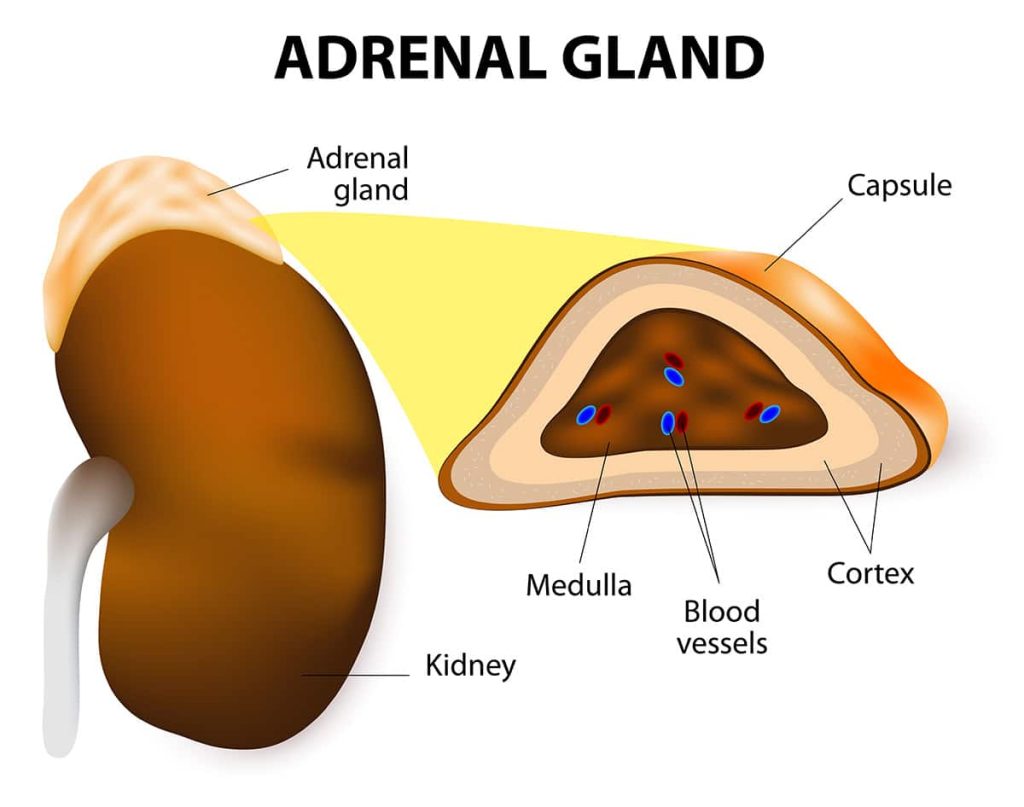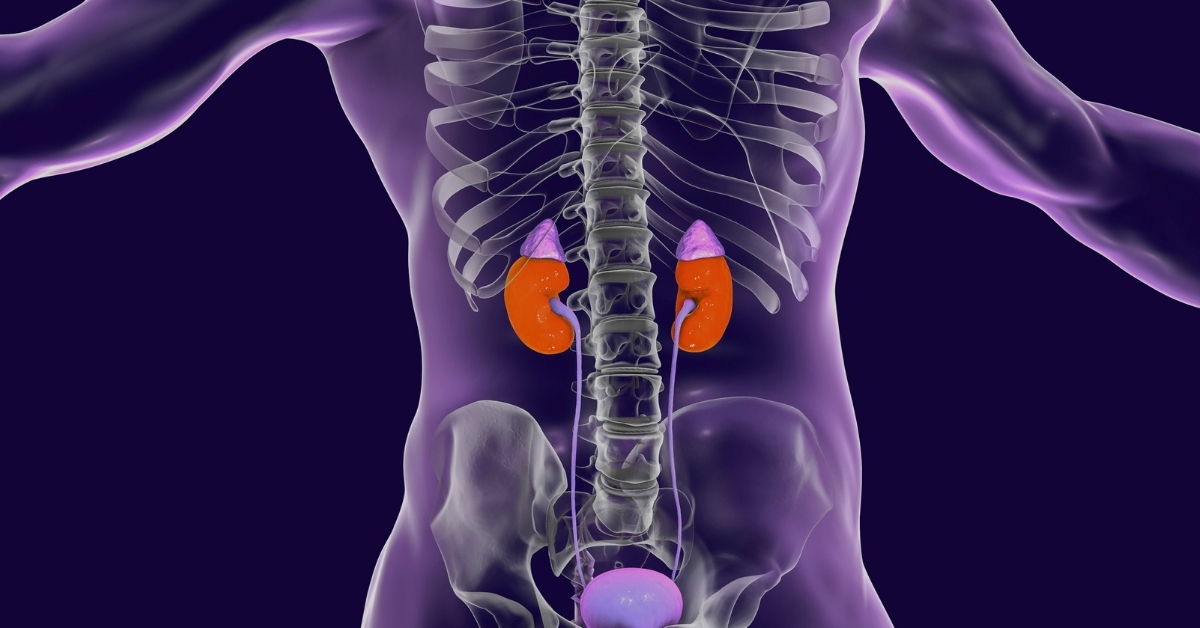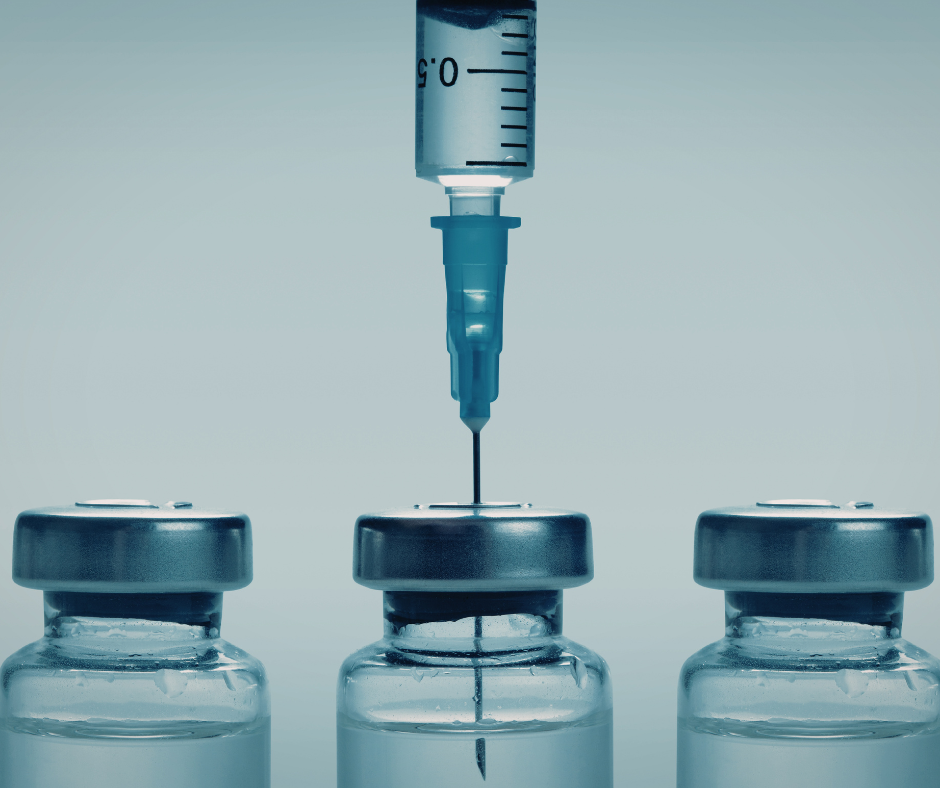Most people have heard of the adrenal glands, but few realize their vital role in helping the human body function. If the adrenal glands or damaged or suffer genetic problems, it can wreak havoc on your health. It’s therefore important that you visit a doctor as soon as possible if you notice any symptoms of adrenal gland disorders. Keep reading to find out about the function of the adrenal glands and how to treat any related disorders.

Overview and Function
The adrenal glands are relatively small, triangular-shaped glands that sit above the kidneys, hence their name (“adrenal” roughly translates to “near kidneys”). They are made up of two main parts, each producing specific hormones vital for normal human function.
- The outer layer of the adrenal gland is called the adrenal cortex and produces the hormones cortisol and aldosterone.
- The inner part is known as the adrenal medulla and produces adrenaline and noradrenaline.
Cortisol
The cortisol hormone plays an important role in the body’s “flight or fight” response and controls stress levels. When the human body is placed in a high-stress situation (such as encountering an aggressive dog), cortisol levels will spike. This regulates the metabolism and blood sugar levels, as well as reduces inflammation.
Aldosterone
This hormone is an essential part of good cardiovascular health. Its main function is to regulate blood pressure and sodium levels in the body.
Adrenaline
Most people know adrenaline as the hormone that gives us energy during stressful situations. Similarly to cortisol, it plays a huge role in the body’s fight or flight response by preparing us for what the brain perceives as danger.
Adrenaline increases the heart rate and provides more oxygen to the muscles in case we have to run away from danger. It also reduces the body’s ability to feel pain, which is why adrenaline is released while getting a tattoo or piercing.
Noradrenaline
Noradrenaline works in tandem with adrenaline in that it helps the fight or flight response. However, it is also responsible for sexual arousal, mood control, and memory.
Clearly, the adrenal glands are absolutely vital for the general function of the human body. So what happens if they don’t work as they should?
Adrenal Gland Disorders and Treatment
Addison’s Disease
Addison’s disease develops when the adrenal glands do not produce enough cortisol and aldosterone. It is an autoimmune condition, meaning it cannot be caused by lifestyle habits or the sufferer’s actions. Some causes of Addison’s disease include:
- Genetic defect/family history
- Immunosuppressants (such as chemotherapy)
- HIV and AIDs
- Injury to/removal of adrenal glands
This is a rare but serious disorder that causes gradual damage to the adrenal gland over a long time. This can sometimes mean symptoms are not picked up. They include:
- Extreme fatigue
- Abdominal pain
- Low blood pressure
- Vomiting and diarrhea
- Muscle weakness
Addison’s disease symptoms are similar to other disorders, so sufferers may not pick up on it at first. However, it must be treated correctly. Addison’s disease is a lifelong illness with no cure, but with the help of hormone replacement therapy, you will be able to live a normal healthy life.
Cushing Syndrome
This disorder occurs when the adrenal glands produce the cortisol hormone in excessive quantities. Sufferers often have characteristic weight gain in their middle and between the shoulders, creating what is known as a “buffalo hump.”
Cushing syndrome is most often caused by the long-term use of high-dose corticosteroids, such as prednisone. However, it can also be caused by benign tumors on the pituitary gland and familial history/genetic predisposition.
Besides the characteristic weight gain, symptoms of this disorder include:
- Fragile skin that bruises easily
- Fertility issues
- Cuts that heal slowly
- Mood swings and depression
If left untreated, Cushing’s syndrome can lead to conditions such as osteoporosis and type 2 diabetes. It’s therefore important to treat it as soon as symptoms are spotted.
The treatment for Cushing’s syndrome depends on the cause. If it is due to overuse of corticosteroids, stopping the medicine will often reverse the symptoms of this disorder. However, if it’s caused by genetics or a tumor, you may have to take medication or undergo radiotherapy.
Adrenal Cancer
Adrenal cancer is rare, but anyone can be affected (although it is most common in over 40s and children under five).
Like with most cancers, there is no clear cause for adrenal cancer. However, those with certain disorders will be at a greater risk for developing this cancer. These include:
- Carney complex
- Lynch syndrome
- Li-Fraumeni syndrome
The symptoms for this illness will be very similar to other adrenal gland disorders like Addison’s disease and Cushing syndrome, including muscle weakness, abdominal pain, and unintentional weight loss. It’s therefore important to visit a doctor if you experience any of these symptoms to be properly diagnosed.
Early detection is the key to curing adrenal cancer. If it is still in the early stages, surgery can usually remove the cancerous tumor in its entirety. However, if cancer has progressed, radiotherapy or chemotherapy will be recommended.
How to Keep Your Adrenal Glands Healthy
You can do several things to maintain the health of your adrenal glands and help prevent certain disorders.
- Good sleep hygiene – aim for 7-8 hours every night
- Eat a nutritious diet full of fruits, vegetables, and whole-grains
- Find a healthy outlet for stress management
- Limit your consumption of triggers like caffeine and alcohol
- Exercise regularly
You should always strive to maintain a healthy lifestyle, particularly if you’re predisposed to certain adrenal gland disorders. If you exhibit some of the symptoms of these disorders but cannot be diagnosed, doctors will often label you as having adrenal fatigue. Luckily, this is usually reversible by following health guidelines and avoiding excessive stress.
Treatments
The adrenal glands are just one part of the intricate system that makes up the human body, and they are essential to regulate both physical and psychological stress. Some adrenal gland disorders are genetic, while others can be avoided with some simple lifestyle alterations. The good news is that the vast majority of these disorders are highly treatable.
Health care providers use a variety of surgical and medical treatments for adrenal gland disorders. These include:
- Surgery to remove tumors in the adrenal gland or, when appropriate, surgery to remove one or both of the adrenal glands
- Minimally invasive surgery is performed through the nostrils to remove tumors in the pituitary gland.
- Medication to stop the excess production of hormones
- Hormone replacement therapy
Hormone Replacement Therapy
Because adrenal gland tumors may produce excess hormones, the doctor may prescribe various medications to control these levels. For example, after surgery, a patient may need medication to block the effects of excess cortisol. Your HRT (hormone replacement therapy) plan may include adrenal hormone medications such as Pregnenolone and DHEA. Both of these hormones are naturally produced in the body by the adrenal gland. Pregnenolone is most indicated with low cortisol combined with low 17-OH progesterone, a precursor to cortisol. DHEA helps produce other hormones, including testosterone and estrogen. Our physicians prescribe pharmaceutical-grade Pregnenolone and DHEA in the following dosages:
(Pregnenolone + DHEA) Micronized Sustained Release
- 25mg + 10mg
- 25mg + 25mg
- 50mg +10mg
- 50mg +25mg
- 50mg + 50mg
Before beginning HRT, a hormone blood panel and physician consultation are required. These help the physician understand the patient’s body and which treatments will be the most effective. During the consultation, your physician will review your blood test results while answering questions you may have about levels and treatment.
Getting Started with HRT
If you’re at all concerned with the health of your adrenal glands, contact your doctor or a qualified telemedicine provider like EVOLVE. Our team of hormone therapy experts will help you get started with a safe, effective, and affordable hormone treatment plan. Contact Patient Care @EVOLVE to schedule your consultation!






